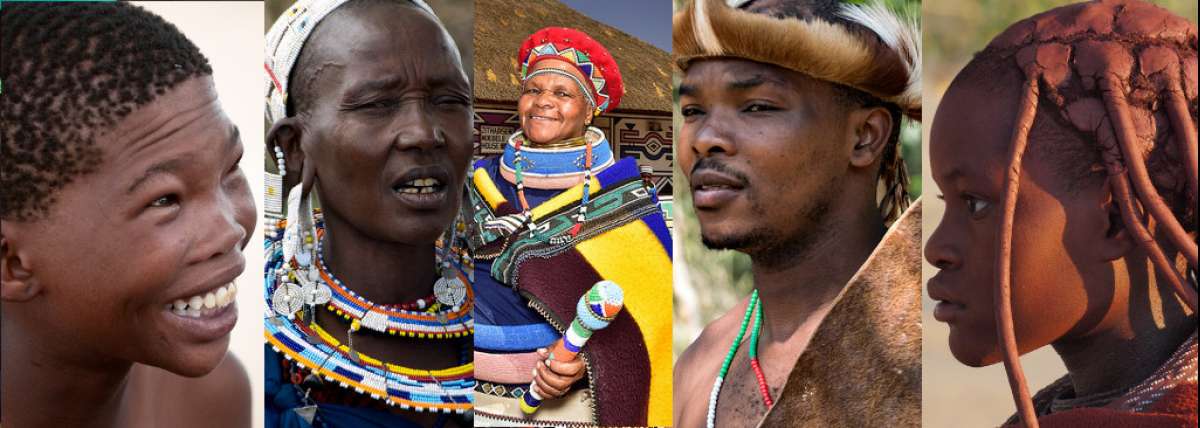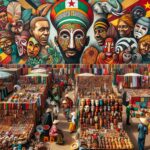Get ready for an adventure that’ll take you to places you never knew existed! We’re talking about uncovering the secret treasures of Africa’s cultural traditions. These ancient practices, beliefs, and rituals are like a hidden world waiting to be discovered. Join us as we dive into the vibrant tapestry of African culture, exploring the parts that most people don’t know about. You’ll be amazed by the customs and traditions that have survived for centuries, telling the story of a continent rich in history and beauty.
Lesser-Known African Cultural Traditions: Unveiling Hidden Treasures
Africa! The very word conjures up images of vast savannas, incredible wildlife, and vibrant cultures. It’s a continent that hums with a history as old as time itself, and where traditions are woven into the very fabric of life. While some African customs are famous around the world, there are countless others, tucked away in different corners of the continent, just waiting to be discovered. Think of these traditions like hidden treasures, each one a window into a unique way of life.
Whispers from the Past: The Nok Civilization
Let’s take a journey back in time, to Nigeria around 500 BC. This is where the Nok people thrived, leaving behind an artistic legacy that still wows archaeologists today. Imagine unearthing terracotta sculptures so detailed they practically whisper stories of daily life from millennia ago! These sculptures weren’t just pretty faces; they provide a glimpse into the Nok’s rituals, beliefs, and even their fashion sense! Sadly, much of the Nok civilization remains a mystery. We’re still piecing together their story, but those expressive sculptures offer tantalizing clues.
Starry Wisdom: The Dogon People’s Beliefs
Fast forward to present-day Mali, where the Dogon people live in a land painted with ochre hues. Their beliefs are deeply connected to the cosmos, particularly the star Sirius. Now, here’s where it gets really interesting: the Dogon have knowledge about Sirius that seems to predate modern astronomy. They speak of a companion star to Sirius, invisible to the naked eye, which wasn’t scientifically confirmed until much later! How did they know? Some suggest ancient astronomical observations, while others propose contact with other civilizations. The debate continues, shrouding the Dogon’s celestial knowledge in intrigue.
More Than Just a Party: The Power of Festivals
Imagine a sea of colorful costumes, the rhythmic beat of drums echoing through the air, and the infectious joy of people dancing as one. Festivals are a huge part of African culture, and they’re about so much more than just having fun. They mark important events like harvests, new beginnings, and the passage into adulthood. Each festival is like a vibrant tapestry, woven with music, dance, and stories passed down through generations. And let’s not forget the food! Festivals are a feast for the senses, a celebration of life itself, and a powerful way to keep traditions alive.
Learning from the Past, Shaping the Future: The Sankofa Symbol
Imagine a bird with its head turned backwards, carrying a precious egg in its beak. This is the Sankofa, a powerful symbol found in many West African cultures. It reminds us that we shouldn’t be afraid to look back to our past, to learn from our ancestors’ wisdom and mistakes. Just like the bird carries the promise of new life in its egg, the Sankofa teaches us to use the past to build a brighter future. It’s a beautiful reminder that traditions aren’t stuck in time; they can evolve and grow, connecting us to those who came before us.
Exploring these lesser-known traditions is like embarking on an adventure, each discovery revealing a new layer of Africa’s rich tapestry. So, keep your mind open, your curiosity piqued, and who knows what hidden treasures you might uncover!
What are African traditions?
Africa isn’t just a continent; it’s a tapestry of diverse cultures, each with its own unique customs and ways of life passed down through generations. These traditions, like threads in a vibrant tapestry, represent the heart and soul of Africa.
From rituals to everyday life, Africa’s cultural heritage comes alive. Imagine vibrant initiation rituals where young people officially become adults, often involving special dances, songs, and maybe even some secret knowledge passed down from the elders. Think about ceremonies asking for good luck and protection from spirits, or traditions celebrating bravery and strength, like the incredible bull-jumping practiced by the Hamar people in Ethiopia. There are even festivals where, playfully, a man might “steal” his bride as part of the courtship process – talk about a memorable wedding story!
It’s important to remember that every tradition has a deep meaning behind it, reflecting the values and beliefs of that community. For example, some cultures have practices like virginity tests, which, while controversial, highlight the significance placed on purity and marriage within those specific societies.
These traditions aren’t just stuck in the past; they’re very much alive and help to shape the identity of African people today. Imagine the music that gets your feet tapping, the clothes that make a statement, even the stories told around a fire – these all have their roots in tradition. By keeping these customs alive, communities stay connected to their ancestors and pass on a sense of belonging to the next generation.
Think of it this way: traditions are like a bridge connecting the past, present, and future. They remind us of where we came from, give us a sense of who we are, and provide a foundation for where we’re going. And that’s something worth celebrating, wouldn’t you say?
What are the “barbaric” traditions in Africa?
As we’ve explored the diverse tapestry of traditions across Africa, it’s important to acknowledge that some customs might seem different or even shocking to those from other parts of the world. It’s crucial to remember that these practices often have deep roots and meanings within their cultures, even if they challenge our understanding.
For instance, the practice of animal sacrifice in Ethiopia, while potentially unsettling to some, is often a deeply spiritual act, connecting people to their ancestors and beliefs. Similarly, the Wodaabe tribe’s tradition of “wife stealing” might sound outlandish, but within their culture, it’s a complex social dance with its own rules and significance.
However, certain practices are undeniably harmful and considered violations of human rights. Female Genital Mutilation (FGM), for example, persists in some communities despite being illegal in many countries. This harmful practice is often rooted in cultural beliefs about womanhood and purity, but it carries serious health risks and represents a violation of girls’ and women’s rights. Sadly, the killing of children born with disabilities also occurs in some areas, driven by deeply ingrained cultural beliefs and superstitions.
Looking back in history, we see evidence of human sacrifice in some ancient African cultures. While this practice is largely condemned today, it’s a stark reminder of the powerful role religion played – and continues to play – in shaping traditions and social norms.
It’s also crucial to remember that “tradition” isn’t frozen in time. Many of these customs have evolved and adapted over generations. Puberty rites, for example, might look different today than they did centuries ago, reflecting changing social values and realities. The resilience and adaptability of African cultures mean that traditions are constantly being reshaped and redefined, often in response to internal and external pressures.
Navigating Cultural Sensitivity:
When encountering traditions different from our own, it’s essential to approach them with sensitivity and a willingness to learn:
- Cultural Relativism: Try to understand practices within their own cultural context, rather than judging them solely by your own values.
- Open Dialogue: Engage in respectful conversations about these traditions, acknowledging both their cultural significance and potential harms.
- Evolving Practices: Recognize that traditions are not static; they change and adapt over time, sometimes abandoning harmful aspects.
- Human Rights: While respecting cultural differences, it’s crucial to condemn practices that violate fundamental human rights.
Exploring these complex issues can be challenging, but it’s essential for fostering cross-cultural understanding and promoting positive change.
What are some cultural taboos in Africa?
Let’s explore some specific examples of cultural taboos you might encounter in different parts of Africa. Remember, Africa is a vast continent with a kaleidoscope of cultures, so what’s considered taboo in one place might be completely acceptable in another.
Consider how we use utensils in the West – the left hand typically holds the fork, and the right hand uses the knife. However, in many African cultures, eating with your left hand is a big no-no, likely stemming from the tradition of using the left hand for hygiene purposes after using the toilet. Sticking to your right hand for eating is always a safe bet.
Respect for elders is paramount in many African societies. Interrupting an elder while they’re speaking is considered highly disrespectful. Similarly, directly addressing or contradicting someone older without their permission is frowned upon. It’s all about showing deference to their wisdom and experience.
Clothing etiquette also varies significantly. What might be considered appropriate attire in one culture could be inappropriate in another, often tied to religious beliefs and cultural sensitivities. For example, in some more conservative communities, women might wear headscarves or more modest clothing. Researching local customs beforehand is always wise.
Remember, this is just a glimpse into the intricate world of cultural taboos in Africa. The key takeaway is to be mindful, respectful, and open to learning about the customs of the specific communities you encounter. Don’t hesitate to ask questions – most people are happy to share their culture with curious and respectful visitors. After all, understanding and appreciating cultural differences is what makes cultural exchange so enriching!
What was Africa’s earliest known culture?
Delving into Africa’s ancient past, the Nile Valley in Egypt emerges as a cradle of civilization. Around 3000 BCE, the Ancient Egyptians flourished, leaving behind a legacy of awe-inspiring architecture, hieroglyphic writing, and advanced knowledge in mathematics, astronomy, and medicine.
However, Africa’s cultural narrative extends far beyond the banks of the Nile. In central Nigeria, the Nok culture thrived from around the 5th century BCE to the 2nd century CE, renowned for their remarkable terracotta sculptures that offer glimpses into their daily life, rituals, and even their fashion sense.
Traveling further west, the Dogon people of the Sahel region possess ancient knowledge about the Sirius star system, predating modern astronomy. Their profound understanding of Sirius’s companion star, which remained invisible to the naked eye until much later, suggests a deep connection to the cosmos and advanced astronomical observation techniques.
It’s important to note that our understanding of the past is constantly evolving. New archaeological discoveries and research continuously challenge existing knowledge and shed new light on Africa’s earliest cultures. As we continue to explore the continent’s rich history, we can anticipate uncovering even more captivating secrets about Africa’s earliest civilizations.
What are the 7 traditions?
While pinpointing precisely seven traditions that encapsulate the vastness of African culture would be an oversimplification, we can explore several key aspects that weave together the intricate tapestry of traditions across the continent.
1. Ancestral Veneration: Respect for ancestors is a cornerstone of many African cultures. It’s not just about remembering those who came before but believing they continue to influence the present, offering guidance and protection.
2. Initiation Ceremonies: Marking the transition from childhood to adulthood, initiation ceremonies often involve physical and mental challenges, symbolic rituals, and the passing down of knowledge from elders, signifying a profound transformation and integration into the community.
3. Oral Storytelling: Passed down through generations, oral storytelling is more than just entertainment. It’s a living library of history, knowledge, values, and beliefs, preserving cultural heritage and captivating listeners of all ages.
4. Music and Dance: Music and dance are integral parts of African culture, often intertwined with rituals, ceremonies, and celebrations. They provide a vibrant expression of emotions, storytelling, and social bonding.
5. Community Values: Collective responsibility, sharing, and interdependence are highly valued in many African cultures. Extended family networks provide support, and communities come together to celebrate milestones and support each other.
6. Art and Symbolism: African art is rich in symbolism, often reflecting beliefs, values, and stories. From intricate masks and sculptures to colorful textiles and pottery, art serves as a powerful means of expression and cultural preservation.
7. Respect for Elders: Elders hold a revered position in many African societies. Their wisdom, experience, and knowledge are highly valued, and younger generations are taught to show them deference and respect.
Remember, these are just a few examples, and the diversity within African cultures means that traditions vary significantly across regions and ethnic groups. Exploring the nuances of each culture’s unique practices is an ongoing journey of discovery.
What is unique about African culture?
African culture stands out for its remarkable diversity, deep-rooted traditions, and vibrant artistic expressions. Let’s delve into some key aspects that make it so unique:
Living Traditions
African cultures are steeped in traditions that permeate everyday life. Elaborate ceremonies mark significant life events, while rituals connect people to their past and guide their present. For instance, the Maasai people of Kenya and Tanzania, known for their striking red robes and beaded jewelry, maintain a deep connection to their cattle, which are central to their way of life.
Ancestors are Everything
Many African cultures place immense importance on honoring ancestors. It’s not just about remembering them but believing they continue to play an active role in the lives of their descendants, offering guidance and protection. The Igbo people of Nigeria, for example, hold a strong belief in the power of ancestors and often seek their guidance when making important decisions.
Art That Speaks Volumes
African art is renowned for its vibrancy, creativity, and symbolism. From the intricate carvings of the Makonde people of Tanzania to the awe-inspiring masks of the Bamana people of Mali, art is an integral part of daily life, serving not just as decoration but as a powerful means of storytelling, conveying history, beliefs, and spiritual experiences.
These are just a few glimpses into the unique tapestry of African culture. Every corner of the continent reveals new surprises and insights into the rich heritage and traditions of its people.
What are the three main religious traditions in Africa?
Africa’s religious landscape is a fascinating blend of ancient beliefs and introduced faiths. While diverse spiritual practices exist across the continent, three main religious traditions stand out:
- Traditional African Religions: These religions emphasize a deep connection to nature, ancestors, and a supreme creator. Animism, the belief that spirits reside in all living things, is a common thread, highlighting the interconnectedness of life.
- Christianity: Introduced to Africa centuries ago, Christianity has taken root and flourished, evolving into diverse branches like Catholicism and Protestantism. Its message of salvation and hope has resonated with millions, shaping cultural and social landscapes across the continent.
- Islam: With its emphasis on one God (Allah) and the teachings of the Prophet Muhammad, Islam has had a significant influence on Africa, particularly in the northern and western regions. It emphasizes prayer, fasting, and pilgrimage, fostering a strong sense of community among its followers.
What makes Africa’s religious landscape even more captivating is the interaction and blending of these traditions. It’s not uncommon to find elements of one faith seamlessly woven into another, creating a unique tapestry of spiritual expression. For example, someone might identify as Christian while still honoring their ancestors through rituals rooted in traditional beliefs. This dynamic interplay between faiths makes studying religion in Africa incredibly enriching, revealing a vibrant landscape shaped by shared histories and evolving practices.
What are the three types of African rituals?
African rituals are diverse and deeply ingrained in the continent’s cultural fabric, serving as a powerful reminder of the connection between the past, present, and spiritual realm. Here are three prominent types of rituals you might encounter:
1. Ancestral Veneration Rituals: Honoring ancestors is paramount in many African cultures. These rituals, often involving offerings, libations, and prayers, are a way to show respect, seek guidance, and maintain a connection with those who came before.
2. Initiation Rituals: Marking the transition from childhood to adulthood, initiation ceremonies often involve rigorous physical and mental challenges, symbolic rituals, and the imparting of knowledge from elders. These rituals signify a profound transformation and the acceptance of new responsibilities within the community.
3. Healing and Purification Rituals: Traditional healers play a vital role in many African societies, addressing both physical and spiritual ailments. Healing rituals might involve herbal remedies, chants, spiritual practices, and offerings to restore balance and well-being. Purification rituals aim to cleanse individuals or communities from negative energies or prepare them for important events.
It’s crucial to remember that the specific expressions of these rituals vary considerably across Africa’s diverse cultures. What remains consistent is the profound significance attached to ritualistic practices as a means of connecting with ancestors, marking life transitions, and seeking spiritual guidance and healing.
What is the family tradition in Africa?
Family is the cornerstone of many African cultures, characterized by strong bonds, extended family networks, and deep respect for elders. Here are some key aspects of family traditions in Africa:
Extended Family: Unlike the nuclear family structure common in many Western cultures, African families often extend beyond immediate relatives to include grandparents, aunts, uncles, cousins, and even close friends. This broader network provides a strong support system, sharing resources, responsibilities, and a sense of belonging.
Respect for Elders: Elders hold a revered position in African societies. Their wisdom, knowledge, and life experiences are highly valued. Younger generations are taught to show deference, seek their guidance, and care for them in their old age.
Marriage and Family Ties: Marriage is often seen as a union of two families rather than just two individuals. Elaborate ceremonies and traditions mark the occasion, signifying the merging of lineages and strengthening family bonds.
Communal Living: Living in close proximity to family members is common in many African cultures. This fosters strong intergenerational relationships, shared responsibilities, and a sense of collective identity.
Oral History and Storytelling: Family history and traditions are often passed down through generations through oral storytelling. Elders share stories, proverbs, and teachings, ensuring the continuity of cultural knowledge and values.
It’s important to acknowledge the diversity within African cultures and recognize that family traditions can vary significantly across regions and ethnic groups. These general observations provide a starting point for understanding the importance of family, respect for elders, and the interconnectedness of generations in many African societies.
What are 5 facts about African culture?
Here are five captivating facts about the diverse and dynamic nature of African culture:
- A Continent of Diversity: Africa is home to over 3,000 distinct ethnic groups, each with its own language, traditions, and cultural practices. This incredible diversity makes Africa a melting pot of heritage and a testament to human creativity.
- Ancestral Connections: Ancestor veneration is a common thread across many African cultures. It’s believed that ancestors continue to influence the lives of their descendants, offering guidance and protection. Rituals, offerings, and stories help maintain these vital connections.
- The Power of Storytelling: Oral storytelling is an art form in Africa, used to pass down history, knowledge, values, and beliefs through generations. It’s a vibrant way to entertain, educate, and preserve cultural heritage.
- Art as Expression: African art is renowned for its vibrancy, symbolism, and diversity. From intricate masks and sculptures to colorful textiles and pottery, art serves as a powerful medium for storytelling, reflecting beliefs, values, and cultural identity.
- Family Beyond Bloodlines: The concept of family in Africa often extends beyond immediate relatives to include a broader network of aunts, uncles, cousins, and even close friends. This extended family structure provides support, shares resources, and reinforces a sense of community.
These facts offer just a glimpse into the richness and complexity of African culture. To truly understand its depth and beauty, one must delve into the unique customs, beliefs, and traditions of its diverse people.
Did you know that Africa is the world’s second-largest continent? To know 10 amazing facts about Africa, click on the link.
Additionally, Africa is home to an incredible diversity of wildlife. For fascinating African wildlife trivia, click the link.
- Uncovering Surprising Parallels: England Size Compared to US States - April 19, 2025
- Old Mexico Map: Border Shifts 1821-1857 - April 19, 2025
- Blindness Doesn’t Limit: Popular Blind People’s Inspiring Success Stories - April 19, 2025
















